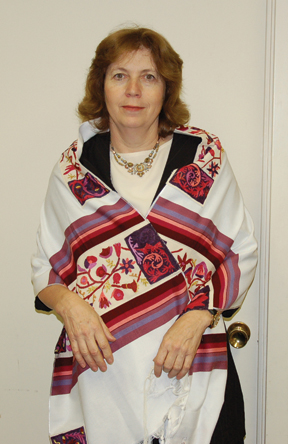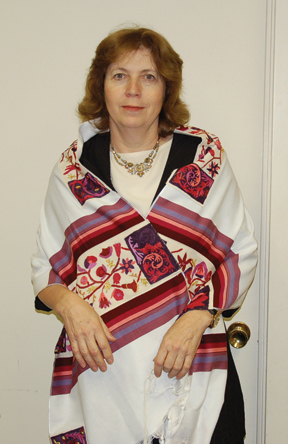Who owns the Kotel? The Western Wall, considered the holiest place in the Jewish world, is supposed to be a unifying place where all Jews can come to pray.
“Unfortunately, the Kotel has become an ultra-Orthodox synagogue,” said Anat Hoffman. 
On July 12, 2010, Jerusalem police arrested Hoffman for the “crime” of praying while carrying a Torah scroll. The act was in violation of a 2003 High Court ruling that prohibits women from reading Torah or wearing tallitot at the Kotel on the grounds these acts might disrupt public order.
Hoffman (pictured left) is executive director of the Israel Religious Action Center, the legal and advocacy wing of the Reform movement in Israel. She was in Houston, March 19-22, to meet with the community and local rabbis. She spoke to Congregation Beth Israel’s Israel Action Committee.
Hoffman’s case still is pending. Her arrest on felony charges raises profound questions about religious authority in Israel. If the Western Wall and the plaza belong to the entire Jewish people, why has one segment of the people (the Haredim) expropriated religious authority over the Kotel? And, do American Jews, who live in a country where religious pluralism is guaranteed under the law, accept a Jewish state where one view of Judaism is accepted as authentic and all others dismissed as secondary?
Sitting in the office of the Jewish Herald-Voice on March 21, Hoffman declared religious pluralism does not exist in Israel.
“All religious affairs in Israel are in the hands of the Orthodox,” said Hoffman. “They have a monopoly on all services and institutions. Our rabbis, both Reform and Conservative, are not recognized. The Hebrew Union College and the Jewish Theological Seminary are not recognized as Jewish institutions of learning in Israel. That means all their graduates are not considered rabbis. Actually, all the non-Orthodox rabbis in the world are not recognized as rabbis in Israel. This is chutzpah.”
Because Reform and Conservative rabbis are not recognized, they are not able to perform weddings in Israel. The wedding is not recognized as legally binding. Neither are these rabbis able to receive a state salary. The government allocation of funding is dependent on a rabbi being a graduate of an officially recognized institution.
Hoffman’s Israel Religious Action Center recently represented a client, Yossi Fackenheim, the son of Emil Fackenheim, in a divorce case. Emil Fackenheim was a Reform rabbi in Germany. Arrested during Kristallnacht (Nov. 9, 1938), Rabbi Fackenheim was sent to Sachsenhausen. He escaped and fled Germany. Rabbi Fackenheim investigated the essential meaning of Judaism in order to come to terms with the Holocaust. To him, the Holocaust became a rationale for Jewish survival. In writings and speeches, Fackenheim became known for reminding Jews not to grant Hitler posthumous victories by forgetting, or by assimilating. In his view, Jewish survival must be the paramount concern for Jews today. Fackenheim made aliyah in 1984.
When his son, Yossi, sought a divorce from his wife in a Jerusalem rabbinic court, rabbinic judge Yissachar Dov Hagar concluded that there was no need for a get (divorce document). Hagar claimed it was inconceivable that the son of a Reform rabbi truly was Jewish. Instead of granting the divorce, Hagar sought to annul the marriage since Yossi was, in his words “not really Jewish,” despite his Orthodox conversion (his mother also was converted at the same time) in Canada. The Israeli High Court overturned the rabbinical court ruling following an IRAC suit.
“What our organization was able to achieve is that all conversions, whether Reform or Conservative, anywhere in the world, are recognized – that is, anywhere outside Israel,” said Hoffman. “But, in Israel, Reform and Conservative conversions still are not recognized. So, these converts would have to fly to Houston, get the approval from the local beit din, and then can fly back to Israel as Jews.”
Religious pluralism works in the U.S. because of the separation of church and state, said Hoffman. That’s not the situation in Israel.
“I’m thinking of Thomas Jefferson,” said Hoffman. “He said that religion is different from politics. In politics, it is ‘united we stand, divided we fall.’ In religion, it’s the opposite. When I drive in Houston and see different religious institutions on every corner, clearly Jefferson was right.
“When your Torah is torn, you don’t call your governor. When you want to hire a new rabbi, you don’t go to the mayor for funding, because the U.S. government doesn’t fund religious leaders. And, it doesn’t favor one stream of religion over another.
“In Israel, we have 4,000 state rabbis, a billion-and-a-half-shekel industry dealing with kashruth, almost 63,000 students who are exempt from the army and devoted to Torah study – at the cost of three quarters of a million shekels (about $250,000) each, plus an army of eruv inspectors, mikveh inspectors, shatnez inspectors. So yes, the Orthodox religious establishment has a economic monopoly with a tremendous interest in maintaining its economic power.”
IRAC has instigated approxi-mately 60 petitions and submissions to Israeli courts, for the last 25 years, said Hoffman.
“We now are in the Supreme Court fighting for recognition of our rabbis to get government funding from the state. So, we’re about to open the door to receive state funding for possibly 200 Reform and Conservative rabbis in Israel. We were able to secure six synagogues that were state built. The Israeli government recently has built six non-Orthodox synagogues in Israel. All the synagogues built in Israel receive some kind of assistance – through allowances, tax breaks or direct funding. Until 2008, when we won the case, all of them were Orthodox synagogues.”
In the field of gender segregation and the exclusion of women from the public sphere, IRAC won a Supreme Court petition filed on behalf of ultra-Orthodox women. Haredim demanded gender segregation on the public buses of Jerusalem – men in front, women in the back of the bus. IRAC legally challenged this form of gender segregation. It now is a felony to harass people for where they are sitting on public bus.
“This extends to El Al and the light rail in Jerusalem, where they were going to have segregated cars for men and women. We had to start riding the buses to make sure the court decision was enforced. We started suing the bus drivers for damages, when they would not stand up for the woman who was harassed. Thirteen drivers were sued for damages. And, we now have freedom riders on the buses to ensure that women are not forced to sit in the back of the bus. This could not have happened without the cooperation of Orthodox men and women.
“Which brings me back to the Western Wall. Why has there never been a Bat Mitzvah at the Kotel?”
Hoffman issued a challenge to the Houston Jewish community. She asked, “Why are you willing to accept that?
“There’s an Israeli Consul General in Houston. Every Jew, Orthodox or non-Orthodox, male or female, should submit a letter to the Consul General. Ask the following questions: Why has there not been a Bat Mitzvah at the Kotel? Why was Anat Hoffman arrested at the Kotel for holding a Torah scroll? Why is there not one Torah scroll in the women’s section?”
by Aaron Howard (Jewish Herald-Voice)

